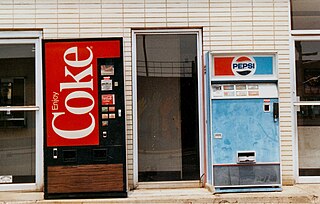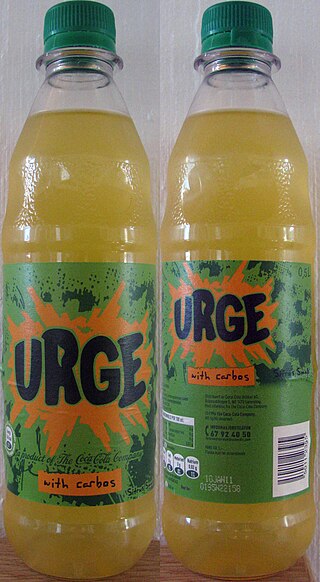Related Research Articles

Coca-Cola, or Coke, is a cola soft drink manufactured by the Coca-Cola Company. In 2013, Coke products were sold in over 200 countries worldwide, with consumers drinking more than 1.8 billion company beverage servings each day. Coca-Cola ranked No. 94 in the 2024 Fortune 500 list of the largest United States corporations by revenue. Based on Interbrand's "best global brand" study of 2023, Coca-Cola was the world's sixth most valuable brand.

Cola is a carbonated soft drink flavored with vanilla, cinnamon, citrus oils, and other flavorings. Cola became popular worldwide after the American pharmacist John Stith Pemberton invented Coca-Cola, a trademarked brand, in 1886, which was imitated by other manufacturers. Most colas originally contained caffeine from the kola nut, leading to the drink's name, though other sources of caffeine are generally used in modern formulations. The Pemberton cola drink also contained a coca plant extract. His non-alcoholic recipe was inspired by the coca wine of pharmacist Angelo Mariani, created in 1863.

Pepsi is a carbonated soft drink with a cola flavor, manufactured by PepsiCo. As of 2023, Pepsi is the second most valuable soft drink brand worldwide behind Coca-Cola; the two share a long-standing rivalry in what has been called the "cola wars".

New Coke was the unofficial name of a reformulation of the soft drink Coca-Cola, introduced by the Coca-Cola Company in April 1985. It was renamed Coke II in 1990, and discontinued in July 2002.

The Cola wars are the long-time rivalry between soft drink producers The Coca-Cola Company and PepsiCo, who have engaged in mutually-targeted marketing campaigns for the direct competition between each company's product lines, especially their flagship colas, Coca-Cola and Pepsi. Beginning in the late 1970s and into the 1980s, the competition escalated until it became known as the cola wars.

Coca-Cola C2 was a cola-flavored beverage produced in response to the low-carbohydrate diet trend. This Coke product was marketed as having half the carbohydrates, sugars and calories compared to standard Coca-Cola. It contained aspartame, acesulfame potassium, and sucralose in addition to the high fructose corn syrup typically found in cola beverages distributed in America.

Thums Up is a brand of cola. It was introduced in 1977 to offset the withdrawal of The Coca-Cola Company from India. The brand was later bought by Coca-Cola who re-launched it in order to compete against Pepsi to capture the market.

The Coca-Cola Company is an American multinational corporation founded in 1892. It manufactures, sells and markets soft drinks including Coca-Cola, other non-alcoholic beverage concentrates and syrups, and alcoholic beverages. Its stock is listed on the New York Stock Exchange and is a component of the DJIA and the S&P 500 and S&P 100 indexes.

PepsiCo, Inc. is an American multinational food, snack, and beverage corporation headquartered in Harrison, New York, in the hamlet of Purchase. PepsiCo's business encompasses all aspects of the food and beverage market. It oversees the manufacturing, distribution, and marketing of its products. PepsiCo was formed in 1965 with the merger of the Pepsi-Cola Company and Frito-Lay, Inc., PepsiCo has since expanded from its namesake product Pepsi Cola to an immensely diversified range of food and beverage brands. The largest and most recent acquisition was Pioneer Foods in 2020 for US$1.7 billion and prior to it was buying the Quaker Oats Company in 2001, which added the Gatorade brand to the Pepsi portfolio and Tropicana Products in 1998.

Pepsi Stuff was a major loyalty program launched by PepsiCo, first in North America on March 28, 1996 and then around the world, featuring premiums — such as T-shirts, hats, denim and leather jackets, bags, and mountain bikes — that could be purchased with Pepsi Points through the Pepsi Stuff Catalog or online. Customers could acquire points from specially marked Pepsi packages and fountain cups. Additional points were sold both by Pepsi and by consumers, the latter mainly enabled by eBay. The first Pepsi Stuff promotion ended on October 31, 1996. It was relaunched 12 years later on February 1, 2008, ended on December 31, 2008, and was relaunched as Pepsi Pass in August 2015. Pepsi Stuff was relaunched on January 22, 2018 with retro editions of Pepsi, and ended on February 28, 2019.

A bottling company is a commercial enterprise whose output is the bottling of beverages for distribution.
Hit is a carbonated fruit-flavored soft drink brand owned by The Coca-Cola Company that is available in Venezuela, and is sold as the Venezuelan counterpart to Coca-Cola's existing Fanta brand.

Urge is a citrus-flavored soft drink produced by Coca-Cola Norway that was first introduced in the country in 1996, and later on was released in Denmark and Sweden. It is the predecessor of the American soft drink Surge, which was introduced in the US in 1997. Urge was discontinued in Denmark and Sweden in 2001. In Norway, Urge sales increased greatly over the years reaching a market share near 10% despite receiving no marketing since its initial launch.
Since its invention by John Stith Pemberton in 1886, criticisms of Coca-Cola as a product, and of the business practices of The Coca-Cola Company, have been significant. The Coca-Cola Company is the largest soft drink company in the world, distributing over 500 different products. Since the early 2000s, the criticism of the use of Coca-Cola products, as well as the company itself, escalated, with criticism leveled at the company over health effects, environmental issues, animal testing, economic business practices and employee issues. The Coca-Cola Company has been faced with multiple lawsuits concerning the various criticisms.

Cherry cola, a distinctive soft drink blend of cherry-flavored syrup and cola, traces its roots to the United States, where it gained prominence in the realm of soda beverages. The origins of this concoction can be situated within the nostalgic ambiance of old-fashioned soda fountains, where it has been consumed by consumers for years.

Coca-Cola Freestyle is a touch screen soda fountain introduced by The Coca-Cola Company in 2009. The machine features 165 different Coca-Cola drink products, as well as custom flavors. The machine allows users to select from mixtures of flavors of Coca-Cola branded products which are then individually dispensed. The machines are currently located in major Coca-Cola partners and retail locations as a part of a gradual and ongoing deployment.

Pepsi-Cola Soda Shop Made with Real Sugar, originally named Pepsi Throwback and Pepsi Made with Real Sugar and still branded that way in some international markets, is a soft drink sold by PepsiCo. The drink is flavored with cane sugar and beet sugar instead of the sugar substitute high-fructose corn syrup that has been used in the standard version of Pepsi within North America since the 1980s.

The food industry of Russia is a branch of industry in Russia.
References
- ↑ "Product Mix". Corporate Finance Institute. Retrieved 2024-10-12.
- ↑ "PepsiCo Marketing Mix (4Ps) Analysis". Boardmix. Retrieved 2024-10-12.
- ↑ "Product Mix of Coca-Cola | PDF | The Coca Cola Company | Coca Cola". Scribd. Retrieved 2024-10-12.
- ↑ "Product Mix Strategy". ProductPlan. Retrieved 2024-10-12.